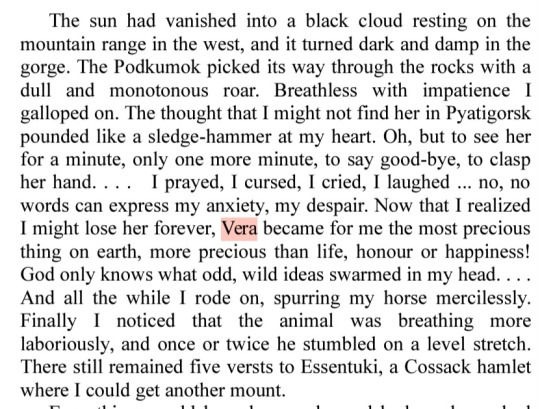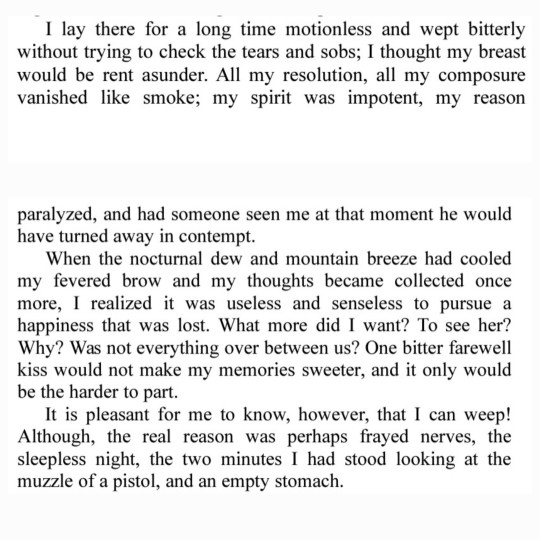#so it has sentimental value. it's like the mona lisa in that i can't fix her but i'll put her up for display for the cultural value
Explore tagged Tumblr posts
Text
seeing people leave kudos and stuff on this One Fic i have up on ao3 consistently leaves me feeling like that one two truths one lie video that goes nooo that'd be soooo embarrassing don't do that no seriously don't. don't do that :(
#.docx#knowing complaints have been thrown regarding chapter 13. save urselves don't read it#i'm only keeping it up bc of the nice comments and also it's the first multichap i've ever finished#so it has sentimental value. it's like the mona lisa in that i can't fix her but i'll put her up for display for the cultural value#but unlike the mona lisa i feel bad that you have to look at her like that
7 notes
·
View notes
Text


Out of all the literary quotes that can be thrown at the Master and thoschei, this one from A hero of our time always struck me as a particularly accurate. Like, when the Master rushes over to keep the Doctor from falling in EoT, this is what popped up in my brain. Why?
Well, A hero of our time is up there with Shamela as earliest cases of recuntruction of a genre. Except where Shamela deconstructs stories that are generally regarded as sham - the mindbogglingly noble innocent girl "fixing" a guy, with none of the introspection to be found in Bronte sisters' works - A hero of our time deals with a more regarded - and objectively artisticly more meritorious - genre of byronic heroes. The main character, Grigory Pechorin, ticks all the boxes of a byronic hero - handsome, young, tragic, romantic, what have you - except unlike his predecessors like Byron's Giaour or Pushkin's Eugene Onegin (that Pechorin is a direct parody of, with both having river-based surnames)... he's aware he's a bastard. Like, there's always a part of him that can look at himself from outside and recognize that he's ruining himself and others, and that there are very easy ways to stop this. If you provided a critical analysis and called him a spoiled rich white boy who needs therapy, he'd be the first to agree. He's an homme fatal in the way of quality noir femmes fatales, who - again, in actually good noir films - strike the audience as much, much more than just sexy objects that can't control their sexuality and selfish impulses.
Which is why the above passage strikes the reader so hard. Yes, it's all written in a memoir convention, but we're still not at the point of deconstructing the peotic frames, what is written is to be taken at face value. And what we find is a flood of emotion, of deeply honest love and desperation that's hard to be brushed aside as a pose. And yet it's the pov character/main character that does so. He even goes for biologization of his state, dismissing it as possibly litte more than exhaustion. He recognizes spleen for a endocrinological imbalance that the name suggests.
The book is perfectly, openly unpreachy. There's no moral here to derive about how to live. It just presents the reader with a character that we are deeply confused about: he's clearly capable of deep, beautiful, noble emotions, yet chooses not to act on them, the moment a single physical obstacle (such horse dying from exhaustion) cuts the stream of consciousness. There's something no longer unsentimental as much as anti-sentimental about it. "People are, by nature, good, and if they just followed their natural empathy and feelings"- no, nothing good would come out of it, at least there's no guarantee.
And yet there's an honesty to it. An honesty that's specifically lacking in usual romantic heroes. There's an awareness that this level of dramaticness in life has to involve an element of cynically orchestrating it. And it's not the case of preachy "and therefore we should dismiss all delusions of such emotional rushes as fake", because there is no fakeness. It's the case of even manipulation being stragnely honest about itself, moreseo than truth could ever be. It appears to be saying "the only way to resolve the mystery of Mona Lisa's smile is to scratch all the paint off the beechwood, do you really think you'll find something truer underneath?". In a way, yes, wood was there beofre da Vinci, but I don't really think that's the reality we're looking for.
That's why when either fandom or the source material goes for getting to the Master "undearneath all performance" it strikes me as empty. No, it's not the Doctor knowing the truth of the Master, it's the case of the Master exposing truths about the Doctor.
Like Pechorin of byronic heroes.
#doctor who#dw meta#using thoschei as warmup for writing. my keyboard needs warm up to stop lagging behind my typing.#thoschei#the master#the doctor#cultural ramblings#tw: animal death#tw: animal abuse#FICTIONAL HORSE! but still i imagine it can be triggering especially if you grew up with neverneding story
11 notes
·
View notes